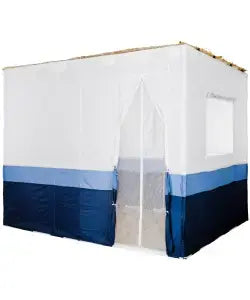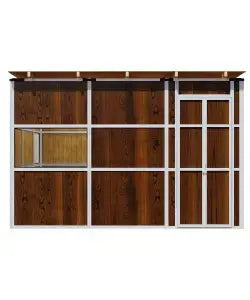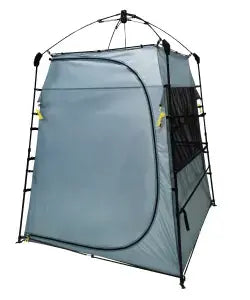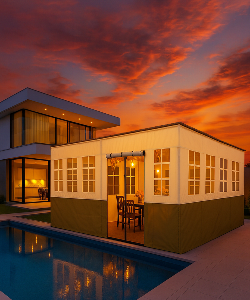Sukkot Rules, Restrictions, and Special Days

The laws of Sukkot may seem quite complicated depending on the depth that you want to go into. They aren't arbitrary restrictions—they're designed to create meaningful experiences while maintaining the essential character of this unique holiday.
Sukkah Building Rules: How to Construct a Kosher Sukkah
The sukkah building laws seem detailed, but they're actually quite logical once you understand the reasoning behind them. The basic principle is creating a temporary dwelling that provides shelter while maintaining connection to the natural world and divine providence.
Wall requirements are straightforward: you need at least two complete walls plus part of a third wall. The walls must be at least 40 inches high—tall enough that you can sit comfortably inside without feeling cramped. There's no requirement that walls be solid; canvas, bamboo screening, or wooden panels all work as long as they provide adequate enclosure.
The walls can be attached to existing structures like your house, garage, or fence. In fact, using an existing wall as one side of your sukkah is common and practical. Just make sure the temporary walls are properly secured and stable enough to support the schach and withstand normal weather conditions.
Spacing between wall panels matters too. Gaps larger than about 10 inches need to be covered or filled, though smaller gaps are acceptable. The goal is creating a sense of enclosure without requiring perfect construction. Remember, this is supposed to be a temporary structure built by ordinary people, not a precision-engineered building.
The floor can be anything—grass, concrete, wooden decking, or even dirt. Some families lay down outdoor rugs or interlocking tiles to create a more comfortable surface, especially if they're planning to spend significant time in the sukkah or have guests who might have mobility concerns.
Sukkah Schach Rules: What to Know About the Roof
The sukkah schach rules are where things get more specific, because the roof covering is what makes a sukkah spiritually meaningful rather than just a backyard shelter. Schach must be made from materials that grew from the ground and are now detached from their source.
-
Bamboo mats are popular because they're readily available, provide good coverage, and meet all the requirements. Palm fronds work beautifully if you can source them. Pine branches, corn stalks, and reed mats are other traditional options. The key is that the material must be natural, unprocessed, and no longer growing.
-
What you can't use includes anything that was never alive (metal, plastic, fabric), anything processed beyond basic cutting (lumber, plywood), or anything still growing (living tree branches). The schach also can't be supported by anything that wouldn't qualify as schach itself—so no using metal beams to hold up your bamboo mats.
-
Coverage requirements balance protection with openness. The schach should provide more shade than sunlight during the day, but you should still be able to see stars through it at night. This isn't just poetic—it's a practical guideline that ensures your sukkah provides shelter while maintaining its temporary, permeable character.
Securing the schach properly is crucial for both safety and compliance. Use natural materials like rope or wire to tie down your covering, and make sure it won't blow away in normal wind conditions. The goal is creating a roof that feels substantial enough to eat under but temporary enough to remind you of life's impermanence.
Sukkot Observance Rules: Dos and Don'ts
Sukkot observance rules focus on dwelling in the sukkah and celebrating the holiday's themes of gratitude and divine protection. The central requirement is eating meals in your sukkah throughout the seven-day festival, particularly bread-based meals and festive holiday meals.
-
The obligation to dwell in the sukkah applies differently depending on circumstances. In good weather, observant families eat all their meals outside. In rain or extreme weather, the requirement is relaxed—you're not expected to suffer for the sake of the mitzvah. Use common sense about safety and comfort.
-
Sleeping in the sukkah is traditional but not universally required. Climate, local regulations, family circumstances, and personal comfort all factor into this decision. Some families make it a special adventure for kids, while others focus on the meal-sharing aspect of the holiday.
-
The Four Species ritual happens daily during morning prayers throughout Sukkot (except on Shabbat). This involves taking the lulav bundle and etrog, holding them together, and waving them in six directions while reciting specific blessings. If you're new to this ritual, don't worry about perfect technique—the intention matters more than precision.
-
Hospitality becomes especially important during Sukkot. The tradition of inviting guests to share meals in your sukkah connects to the holiday's themes of gratitude and community. This can be as simple as asking neighbors to join you for dinner or as elaborate as organizing community-wide sukkah tours.
Sukkot Restrictions: What You Need to Know
Sukkot restrictions are generally less stringent than those for other major Jewish holidays, but there are still some guidelines to keep in mind. The first and last days of Sukkot are treated as full holidays with work restrictions similar to Shabbat, while the intermediate days (Chol Hamoed) have more relaxed rules.
On the first day of Sukkot, traditional work restrictions apply: no driving, cooking, or business activities for observant families. However, food preparation that enhances the holiday celebration is generally permitted. The specific rules vary between different Jewish communities and levels of observance.
The intermediate days of Sukkot allow more flexibility. Many people go to work, run errands, and handle necessary business while still maintaining the holiday's festive character. The focus is on balancing practical needs with the joy and special atmosphere of the festival.
Weather-related restrictions are built into the observance. You're not required to eat in your sukkah during rain, strong winds, or extreme temperatures. The principle is that the sukkah should enhance your celebration, not create hardship. If conditions make outdoor dining unpleasant or unsafe, move inside without guilt.
Travel during Sukkot presents practical challenges since you need access to a kosher sukkah for meals. Some families plan vacations around visiting friends or relatives who have sukkahs, while others seek out communities with public sukkahs available for visitors.
The key to understanding sukkot restrictions is recognizing their purpose: creating space for celebration, reflection, and community while acknowledging the practical realities of modern life. The rules serve the holiday's spiritual goals rather than creating obstacles to meaningful observance.
Need help ensuring your sukkah meets all requirements? Sukkah Market offers expert guidance and quality products, including EZ Lock sukkah systems designed to meet all traditional specifications. Whether you have questions about construction or need to contact Sukkah Market for personalized advice, we're here to help you navigate the sukkot rules with confidence and create a meaningful celebration for your family.







